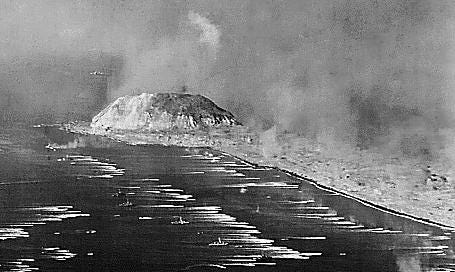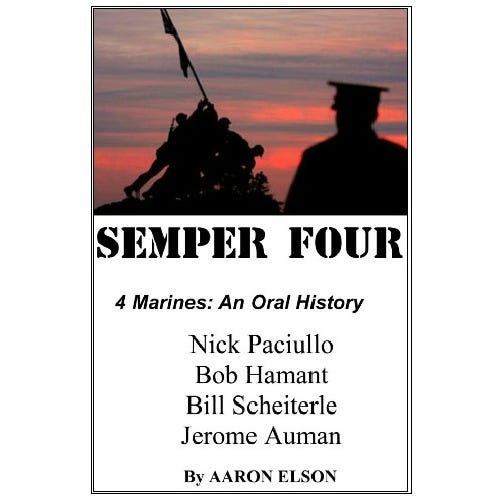This week marks the 79th anniversary of the beginning of the battle of Iwo Jima. When I launched my first web site, in 1997, I posted a lot of stories from my father’s tank battalion and from my interviews with D-Day veterans that I did in conjunction with its 50th anniversary in 1994. The site had a guest book, and one day someone wrote: “How can you call this site World War II Oral History when there’s nothing but the European Theater? Where are the Marines? Where is the Pacific?”
I hadn’t thought about that. So I sought out some Marines. I didn’t have to look very far. Six floors above me in the high-rise where I lived in New Jersey was Nick Paciullo, a veteran of the 4th Marine Division.
“What was your rank?” I asked Nick.
“I was a private … Pfc. … corporal … (short pause) private … Pfc. … corporal… I was a little bad in the service,” Nick said. “I was with two gentlemen — two Marines, I should say — from Chicago: Pudlow and McDowell. They were two crazy guys and I joined them, too. They were in my squad, and we had a lot of fun. We were always in trouble, but we got away with it.”
Naturally, I wanted to know what kind of trouble, if Nick could tell me with his wife in the room.
“It wasn’t dirty or anything like that,” he said. “I’ll give you an incident, what happened one night. The three of us — in fact, there were five or six of us, were walking, and we see this big door open. Big office. We walked in. We’re taking the pencils, and I took a chair with rollers on it. I put one of the guys on the chair and we were rolling him around in San Diego. All of a sudden I’m pushing and I can’t go nowhere. They had my duty belt. It was an MP Marine, oh god, where’d these guys get this stuff? We had a court martial, and we got away with it, because we didn’t rob anything. All we took was pencils and that one chair, and we were having a good time.”
After a couple of months at Camp Pendleton, Nick said, “we hit the Marshall Islands, the first time a fresh Marine division ever hit an island from the States to the enemy.”
“What were your thoughts crossing the ocean?” I asked.
“I didn’t have much thought. I didn’t think nothing of getting killed, shot or anything. We all talked and had a good time. We didn’t say ‘You’re gonna die,’ or anything like this.”
As he spoke, Nick was thumbing through a book on the 4th Marine Division.
“This is my buddy,” he said, when he found the page he was looking for.
“Richard D. Anderson?” I asked.
He handed me the book and I read a citation.
“…gallantry ad intrepidity at the risk of his life above and beyond the call of duty while serving with the 4th Marine Division during action against enemy Japanese forces on Roi Island, Kwajalein Atoll, Mariana Islands, Feb. 1, 1943. Entering a shell crater occupied by three other Marines, Private First Class Anderson was preparing to throw a grenade at an enemy position and it slipped from his hands and rolled toward the men at the bottom of the hole. With insufficient time to retrieve the armed weapon and throw it, Private First Class Anderson fearlessly chose to sacrifice himself and save his companions by hurling his body upon the grenade and taking the full impact of the explosion. His personal valor and exceptional spirit of loyalty in the face of almost certain death were in keeping with the highest traditions of the U.S. Naval Service. He gallantly gave his life for his country.”
This was a Medal of Honor citation.
“Was he in your platoon?”
“My squad, yes,” Nick said. “And he was the fourth guy that we used to go out with. Very nice guy. Pudlow was killed on Iwo, and McDowell lost his leg on Saipan. I almost lost my eye on Kwajalein right after that.”
Five or six guys having a good time together. Of four of them, one receives a posthumous Medal of Honor, one is killed on Iwo Jima, one loses his leg on Saipan and one almost loses an eye.
Nick absorbed 32 pieces of shrapnel from a grenade on Roi Namour. That was when he almost lost an eye. Thirty-one pieces were removed on the hospital ship back to Hawaii, and one was still in because it was too close to a nerve.
Steak and mashed potatoes with onions
While in Hawaii he witnessed the West Loch explosion of May 21, 1944, which he referred to as a second Pearl Harbor, although it was not an invasion but an explosion believed to have been caused by improper handling of mortar rounds while loading ammunition on a ship. The explosion sparked a fire that destroyed six landing ships and killed 163 men and wounded hundreds of others.
Two days later, Nick said, “we got back on the ship and we hit Saipan. Don’t ask me about Saipan. I don’t remember Saipan. The only thing I remember about Tinian is that my company was in the assault and the waves were so rough, and we had to climb over big boulder rocks to get onto the shore. And a lot happened on Tinian I can’t tell you either.”
At the time, Nick was 19 years old.
“Earlier,” I said, “you said that you were young, you were gung-ho, and that you were a scout. What did a scout do?”
“Go out in the front and check things; is it all right for the boys to come through?” he said.
“What would you do when it wasn’t all right?”
“We stopped! I wasn’t a scout long because I got hit again.”
“Three times,” Nick’s wife, Gladys, said.
“How did you get hit the second time?” I asked.
“On Iwo Jima. And the third time I got hit on Iwo Jima. I went back for seconds on Iwo Jima. About two days after we landed I was near an explosion. I went up in the air and I landed on my back. They took me to a hospital ship and I was all right in a day or so, a little more. They gave me a job to do on the hospital ship, and I didn’t like what my job was. Can I say it?”
“You can say it.”
“After the guys would get their legs chopped off and everything, I was the guy that took the legs and stuff like that and put it wherever they told me to put it. I just didn’t like it. Then they were asking for volunteers that want to go back, and I said I’ll to back! I didn’t like what I was doing.”
“That had to be awful.”
“Oh, it was awful. But everybody had a job to do. A buddy of mine from my company was getting off the ship the same time I was, and I said, ‘Bill, let’s go back.’
“We didn’t go right back to the company. We stayed at the beach.”
“A second Pearl Harbor”
“Were you still on the beach when they raised the flag on Mount Suribachi?”
“No,” Nick said. “When they raised the flag I was in my company headquarters. I was not with my original company. They transferred me to headquarters. When we saw that first flag going up, ‘Yaaaaay!!!!!’ Everybody started to holler.”
“When was the second time you were wounded?”
“It was twenty-some-odd days already, because we took the island in 36 days. Our CP was blown up, and I got thrown in the air and landed on my back again.”
Have a piece of apple pie
As the interview wound down — or so I thought; Nick had some pretty cool adventures in the Corps after the war was over — I asked if any of the sights that he saw stood out, or even haunted him. I hadn’t thought about it, but the interview was taking place on Sept. 4, 2002, a week before the first anniversary of September 11.
“Well,” Nick said, “I will tell you this, especially lately, since 9/11. It shook me up pretty good. And I beat the hell out of her in bed, and I’m fighting again. You know, 9/11, we don’t know who we’re fighting. In World War II we knew who we were fighting, we were fighting the Japanese, and what’s happening now, I’m dreaming of Japanese running after me. I don’t know why, but they’re running after me. And I can’t do a damn thing about it. The VA has been giving me some medication. So far I’ve not been too bad, but what was it, last night, Gladys?”
“Most nights.”
“Most nights, see. I kick her out of bed. She sleeps where she is right now [on a sofa].”
“Sometimes he wakes up, he beats himself up, he’s full of blood on his nose and face,” Gladys said. “It’s called post traumatic stress disorder. And now he’s under VA care.”
The full text of my interview with Nick Paciullo is available in the book Semper Four, available at amazon.






Wow! Awesome interviews! Priceless!